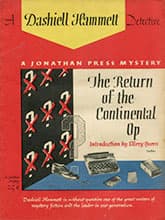The Gutting of Couffignal
Critique • Quotes
 First edition of 1945 collection
First edition of 1945 collectionFirst publication
1925 in Black Mask magazine
First book publication
1945 in The Return of the Continental Op story collection
Literature form
Story
Genres
Crime, mystery, detective fiction
Writing language
English
Author's country
United States
Length
Approx. 14,000 words
The thinking man of action
From its brutal title to its sardonic final lines, "The Gutting of Couffignal" is a showcase for the early hard-boiled detective style practically invented by Dashiell Hammett—in its early action-oriented phase popular in the pulp magazines of the day. So much so that you can forget it's also a story of detection.
This long story—almost a novella—starts slowly. On the exclusive island of Couffignal, Hammett's agent, his famously unnamed "Continental Op", is given the dull job of watching over rich people's wedding gifts.
But gunfire and explosions heard on the island change his assignment. As the community's wealth is plundered by an invading gang and the operative leads the resistance, the action ramps up and up. You can get completely absorbed by the exciting and entertainingly written exploits of the operative, before you're taken by surprise by a plot twist that reminds you: oh yeah, this really is a mystery.
The op has actually figured out who is behind the attempted knockover. All that action was misdirection.At the time, the story's bloodshed—including multiple deaths and injuries by pistols, machine guns, bombs and hand grenades—also misdirected some readers and critics from the story's virtues. Today, when it seems every novel of detection turns into a serial killer epic, the violence of "The Gutting of Couffignal" would probably shock few readers. If anything they may be perplexed by Hammett's casual, matter-of-fact style of relating the action, rather than dwelling on the more grisly aspects.
Will he or won't he?
As decisive as he is in action, the Continental Op drops hints about his inner uncertainty. You can see this in the final confrontation in the story, as the reader wonders whether the detective is going to fire that deciding shot.
You can also pick up in this story, as in much of Hammett's work, a certain ambivalence his character has about continually working for the rich who can afford detectives to protect their positions. And, not to give away the resolution of the mystery, but the identity of the villains fits Hammett's proletarian sympathies—albeit in a surprising way.
When the Op is tempted to join the crooks on Couffignal for a big payoff, he directly addresses his misgivings about his poorly paid job. But in a much-quoted speech he concludes the work of figuring out mysteries and putting away the bad guys interests him more than any chance of great riches.
This is a forerunner of the even more famous concluding speech by Sam Spade in The Maltese Falcon a few years later, dialogue delivered also in the face of temptation—though personal feelings weigh more heavily than wealth in that choice.
But let's not get carried away. "The Gutting of Couffignal" is not exactly Dostoyevsky. It's a thrilling story of criminal action and detection, featuring a sporadically more thoughtful protagonist than in most shoot-em-ups.
— Eric
Critique • Quotes

